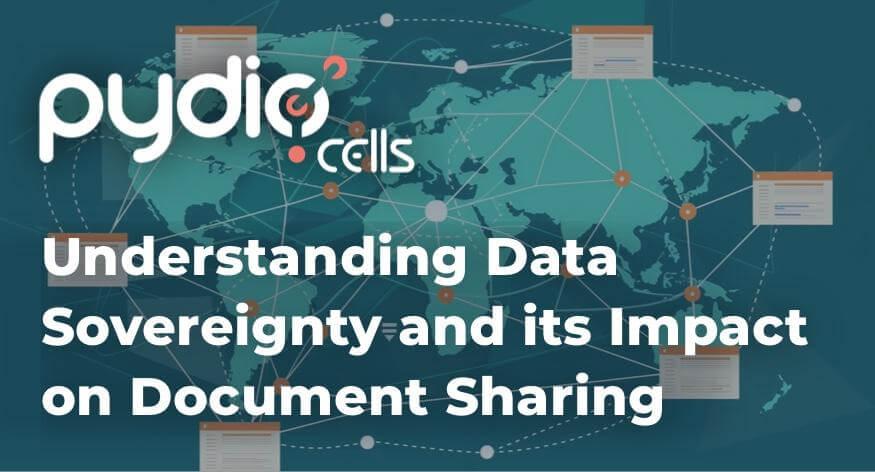Understanding Data Sovereignty and Its Impact on Document Sharing, Collaboration, and Management

In today’s world of overlapping compliance regulations and heightened security concerns, data sovereignty has emerged as a critical issue for organizations – especially for applications that store, share or process sensitive or private data. But what is data sovereignty, and why is it so crucial for document sharing, collaboration and management?
What Exactly Is Data Sovereignty?
Data sovereignty refers to the concept that information is subject to the laws and governance structures within the nation in which it is collected. This idea becomes particularly important when dealing with document sharing, collaboration, and management, as the control, security, and compliance with local privacy regulations and industry-specific regulations can become complex and challenging as data crosses borders — as it often does in today's global business environment.
For instance, the European Union's General Data Protection Regulation (GDPR) imposes stringent rules on data handling. It provides robust data rights to individuals within the EU, regardless of where the data is processed.
The implications of data sovereignty extend beyond compliance with local laws. They also encompass concerns about data security, privacy, and control. Organizations must ensure their data is stored and processed in compliance with local regulations and protected against unauthorized access and breaches.
Data Sovereignty in Document Sharing, Collaboration, and Management
In the context of document sharing, collaboration, and management, data sovereignty presents four main challenges:
-
Compliance: Organizations must ensure their data handling practices comply with the regulatory requirements of the jurisdictions in which they operate. This includes adhering to data protection laws, obtaining necessary consent, and maintaining transparency about data usage.
-
Security: Protecting sensitive information from unauthorized access and cyber threats is paramount. Ensuring data sovereignty means that data storage and processing should occur in secure environments within the jurisdiction, reducing the risk of exposure to foreign surveillance and cyber attacks.
-
Control: Organizations need to maintain control over their data, including how it is accessed, shared, and managed. This control extends to understanding who has access to the data and ensuring that data handling practices align with the organization's policies and local laws.
-
Data Localization: Some countries have data localization laws requiring that data collected within their borders be stored and processed locally. This can impact how organizations manage IT infrastructure and choose service providers.
Pydio Cells: A Solution for Full Control Over Data Sovereignty
Pydio Cells, a powerful, open-source file sharing, collaboration, and management platform, offers a robust solution for organizations seeking full control over data sovereignty. By providing a self-hosted alternative to mainstream cloud storage services, Pydio Cells enables organizations to retain control over their data while ensuring compliance with local regulations.
Here’s how Pydio Cells helps organizations manage data sovereignty requirements:
-
Self-hosting: Pydio Cells can be deployed on-premises or in a private/hybrid cloud, giving organizations complete control over where their data is stored and processed.
-
Security: Pydio Cells is designed with security in its DNA, offering features such as end-to-end encryption, granular access controls, and comprehensive audit logs. These features help organizations safeguard their data and comply with local and international data protection regulations.
-
Data Control and Ownership: With Pydio Cells, organizations retain full ownership and control of their data. Unlike third-party cloud providers, Pydio does not have access to the stored data, ensuring that sensitive information remains private and secure.
-
Integration and Extensibility: Pydio Cells integrates with a wide range of enterprise systems and tools. Its extensible architecture allows for customization while enabling organizations to establish data management practices that align with data sovereignty requirements.
-
Collaboration: Pydio Cells enables teams to work together seamlessly on documents and projects across borders and jurisdictions without compromising data sovereignty.
-
No Single Point of Failure: Avoiding SaaS hosting solutions like AWS means organizations can mitigate risk factors such as the outage caused by the CrowdStrike update worldwide in July, which knocked down 8.5 million Windows computers and shut down entire industries.
If Data Sovereignty is an Issue For You, Take a Look at Pydio
In today's digital landscape, data sovereignty is a critical consideration for organizations that need to share, collaborate, and manage documents as part of their business operations. Ensuring compliance with local regulations, protecting sensitive information, and maintaining control over data are paramount concerns. Pydio Cells offers a robust solution that addresses these challenges by providing a self-hosted platform with comprehensive security, compliance, and collaboration features. With Pydio Cells, organizations can achieve full control over their data sovereignty. For more information, visit Pydio Cells.
Need to Balance Ease-of-Use with Security? Pydio Cells Can Help.
If your organization is serious about secure document sharing and collaboration you need to check out Pydio Cells. Cells was developed specifically to help enterprises balance the need to collaborate effectively with the need to keep data secure.
With robust admin controls, advanced automation capabilities, and a seamless, intuitive end-user experience Pydio is the right choice for organizations looking to balance performance and security without compromising on either. Try Cells live for yourself. Or click on the button below to talk to a Pydio document sharing specialist.